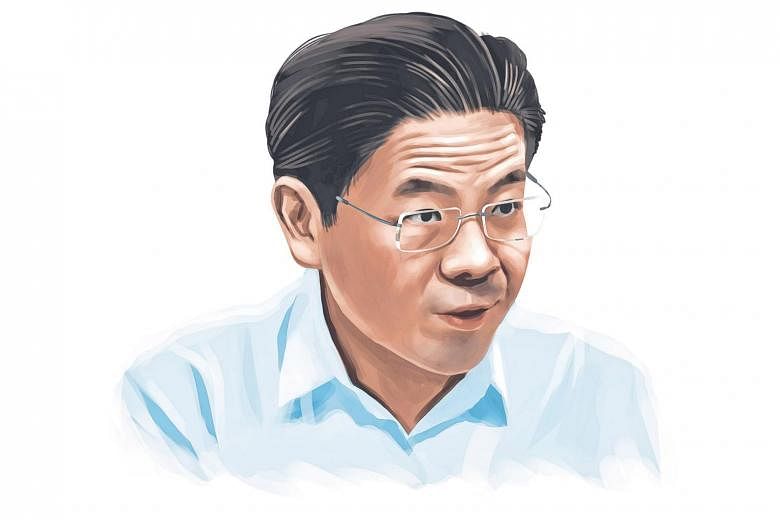SINGAPORE - Mr Lawrence Wong takes over from Deputy Prime Minister Heng Swee Keat as Finance Minister. Having assisted Mr Heng as Second Minister for Finance since 2016, he has, as Prime Minister Lee Hsien Loong said, the experience and is a "natural fit" for the job.
Ms Indranee Rajah supports Mr Wong as Second Minister.
Mr Wong will continue to co-chair the Covid-19 multi-ministry task force together with new Health Minister Ong Ye Kung and Trade and Industry Minister Gan Kim Yong.
Key challenges
• Implement the goods and services tax (GST) hike
The planned GST hike from 7 per cent to 9 per cent will take place between next year and 2025 - sooner rather than later - subject to the economic outlook.
The increase will help Singapore meet its rising recurrent spending needs, especially in healthcare.
The impact will be cushioned by a $6 billion Assurance Package, which delays the effect of the hike for most households by at least five years. The offset is higher for lower-income Singaporeans, with those living in one- to three-room HDB flats receiving about 10 years' worth of additional GST expenses incurred.
• Ensure Singapore remains conducive to business
International tax developments could affect Singapore, whose tax incentives have been instrumental to its investment promotion efforts.
United States Treasury Secretary Janet Yellen has proposed a global minimum corporate tax rate of 21 per cent - higher than the speculated 10 per cent to 12.5 per cent under base erosion and profit shifting (Beps) 2.0 proposals mooted by the Organisation for Economic Cooperation and Development.
All eyes are on how the US proposal could impact ongoing Beps 2.0 discussions, which are set for an agreement in July.
Whether Mr Wong has to make adjustments to Singapore's tax system remains to be seen. But other factors such as infrastructure, a skilled labour market, and sound financial and legal systems still make the Republic an attractive investment destination.
• Stay fiscally prudent and sustainable
With major highways, the Cross Island and Jurong Region MRT lines and climate adaptation structures in the works, Singapore expects a hump in annual development expenditure of around 5 per cent of gross domestic product, higher than the baseline of 3.7 per cent.
A new law will allow the Government to borrow up to $90 billion to pay for such infrastructure, provided that it lasts for at least 50 years.
Aside from funding long-term infrastructure, the Government must also remain fiscally prudent in order to build back the reserves - totalling up to $53.7 billion over last year and this year - which are expected to be drawn down during the Covid-19 pandemic.
While it is expected that expenditure for the remainder of this term of government will be funded without a further draw on past reserves, the global outlook remains murky.
At home, while enhanced support measures have been announced for eateries in view of tightened measures to stem the growing number of community cases, should the situation deteriorate, Mr Wong may need to even consider a second Budget sooner.
• Make opportunities available to all Singaporeans
The pandemic has given rise to calls for more redistributive policies. Some suggestions include making use of existing levers such as the past reserves, and tweaking the Net Investment Returns Contribution (NIRC) framework.
The NIRC framework allows the Government to spend up to 50 per cent of the net investment returns on net assets invested by GIC, the Monetary Authority of Singapore and Temasek, and up to 50 per cent of the net investment income derived from past reserves from the remaining assets. Since 2016, the NIRC has been the single largest contributor to government coffers.
Other suggestions include getting those who are more well-off to give back more to society, such as by paying more personal income tax.
These are difficult decisions which Mr Wong does not have to make now, thanks to Singapore's strong fiscal position. But he may have to grapple with them in future as his ministry tries to strike a balance between the public's demands for more social equity and the potential impact this could have on Singapore's competitiveness.


